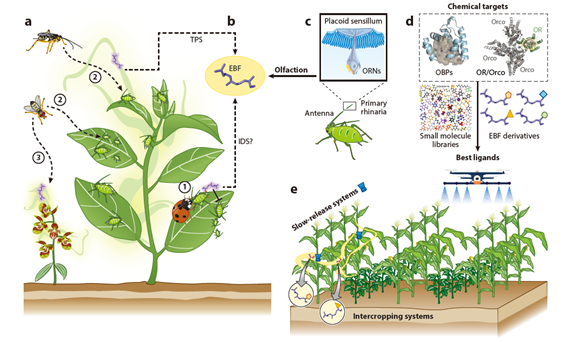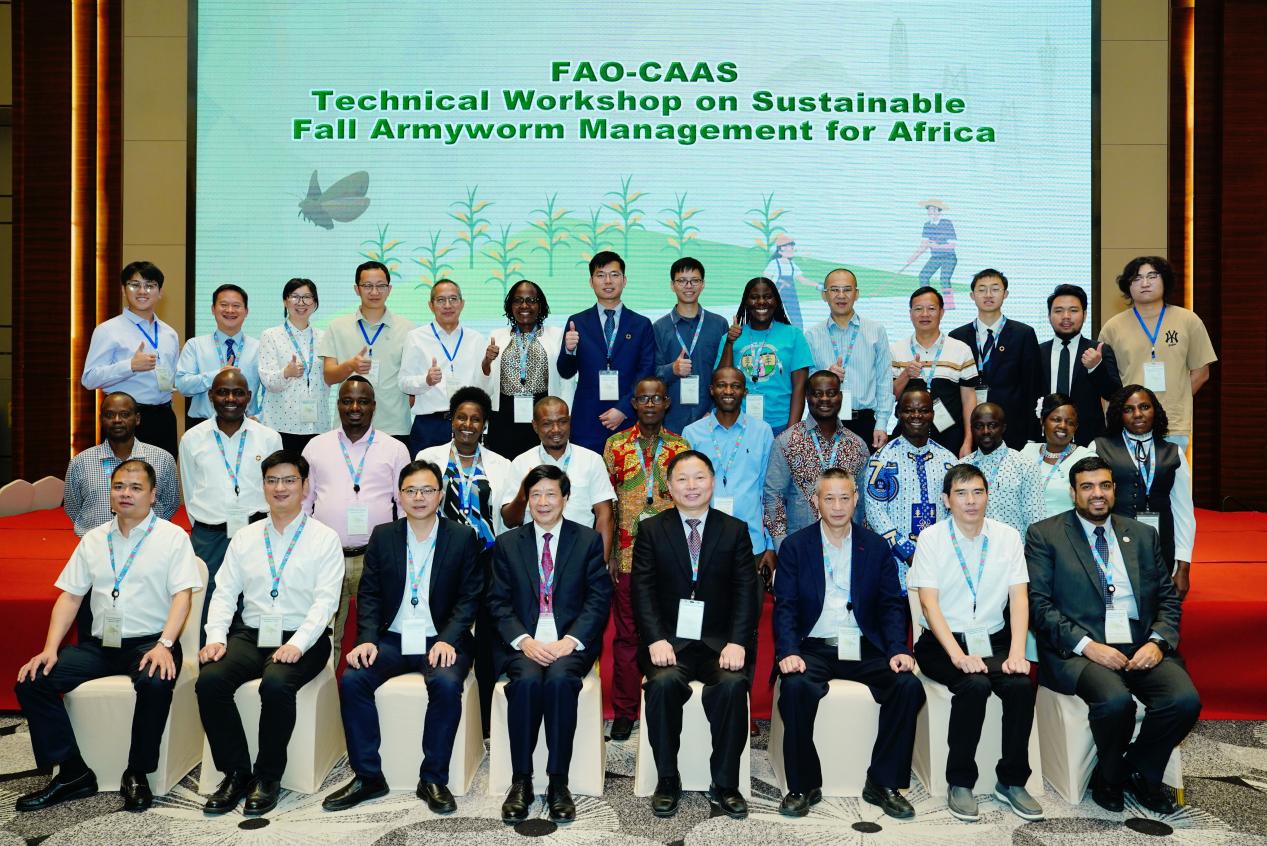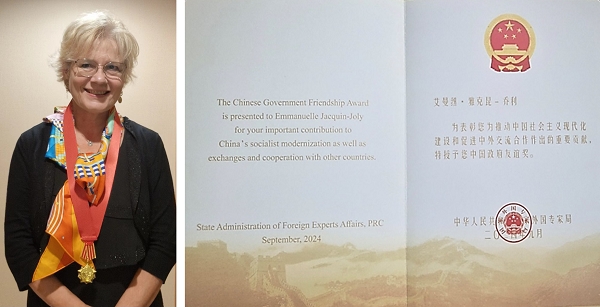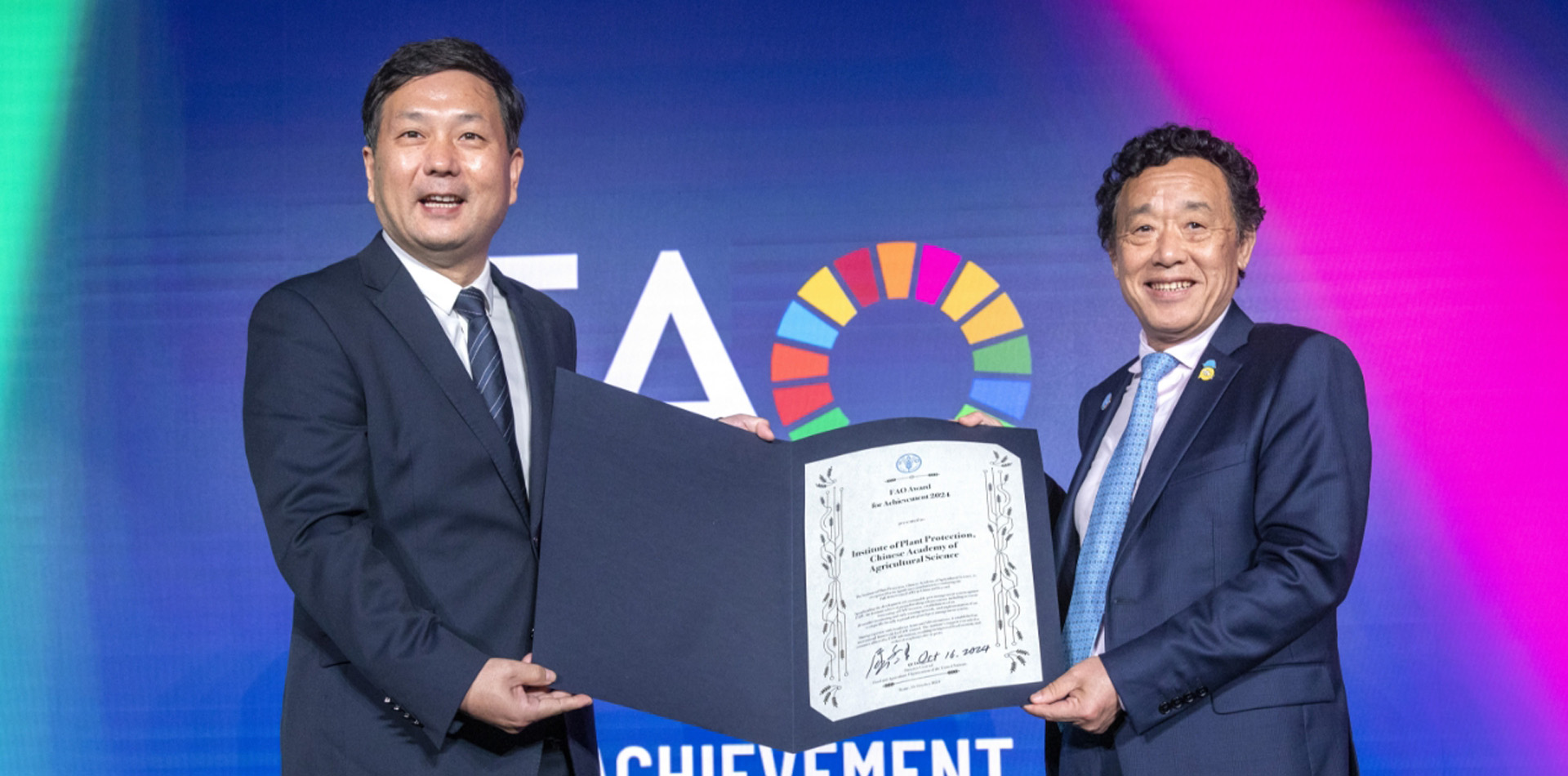IPPCAAS Systematically Reviewed the Regulatory Mechanisms of the Chemical Signal (E)-β-Farnesene in Tritrophic Interactions
Recently, the Innovation Team for research and utilization of functional genes for anti-insects at IPPCAAS, published a review paper titled "The Role of (E)-β-Farnesene in Tritrophic Interactions: Biosynthesis, Chemoreception, and Evolution" in the authoritative journal in entomology, Annual Review of Entomology. The paper systematically elaborates on the diverse sources, synthesis, and release mechanisms of (E)-β-farnesene (EBF), the signal reception patterns across trophic levels, and its evolutionary relationships. It also outlines future research directions, deepening theoretical understanding and practical applications regarding the regulation of tritrophic interactions by this important signaling molecule in ecosystems.
In nature, chemical signals serve as critical mediators for complex communication among organisms. EBF, a typical sesquiterpene compound, was initially identified as an alarm pheromone in aphids and later found to be released by herbivore-induced plant volatiles to attract natural enemies. EBF plays a pivotal role in the tritrophic interactions among plants, aphids, and their predators, revealing sophisticated regulatory mechanisms in nature. Recent advancements in functional genomics, gene editing, structural biology, and computational biology have significantly enhanced our understanding of EBF-mediated interactions in this tritrophic system. Scientists have successfully identified plant EBF synthase genes and explored their functions, while also delving into the biosynthetic mechanisms of EBF in aphids.
Beyond its role as an alarm pheromone influencing aphid behavior, EBF regulates wing polymorphism in aphids, profoundly affecting population dispersal and distribution. Additionally, the release and response to EBF exhibit plasticity under biotic and abiotic factors, enabling plants and aphids to adapt flexibly to dynamic environments and maintain ecological balance. This review provides an in-depth exploration of the regulatory mechanisms of EBF within complex ecological networks, emphasizing its neural and molecular bases in olfactory recognition by aphids and their natural enemies. The paper underscores the importance of studying the biophysical and structural foundations of aphid EBF receptors and their complex interaction patterns with ligands, providing critical targets for developing novel aphid behavior regulators.
Furthermore, the paper advocates using structure-based or machine learning approaches to predict receptor-ligand interactions, aiming to design, optimize, and screen more stable and effective insect behavior regulators. From an evolutionary perspective, EBF mediates an arms race between aphids and their natural enemies. The odorant receptors involved in EBF recognition exhibit convergent evolution, shedding light on the subtle evolutionary relationships between aphids and their predators.
Looking ahead, the knowledge derived from EBF systems will extend far beyond its original scope. With the challenges and opportunities brought by new technologies, EBF research is expected to provide fresh perspectives and insights into ecological regulation and crop protection. As research into EBF and its receptors deepens, innovative pest behavior regulation technologies based on chemical signals like EBF are anticipated to revolutionize agricultural production, contributing significantly to sustainable agriculture.
The paper lists Professor Wang Bing as the first author, Professor Wang Guirong as the corresponding author, and Professor Emmanuelle Jacquin-Joly from the French National Institute for Agriculture, Food, and Environment (INRAE) as a contributor. The study was supported by the National Natural Science Foundation of China, the National Key Research and Development Program's inter-governmental international science & technology innovation cooperation projects, and the CAAS Science and Technology Innovation Project.

-
 IPPCAAS Successfully Organized the FAO-CAAS Technical Workshop on Sustainable Fall Armyworm Management for Africa in Guangdong
IPPCAAS Successfully Organized the FAO-CAAS Technical Workshop on Sustainable Fall Armyworm Management for Africa in Guangdong -
 IPPCAAS Hosts Symposium for CAAS-INARE International Joint Laboratory for Plant Protection to Congratulate Professor Emmanuelle Jacquin-Joly on Receiving the Chinese Government Friendship Award
IPPCAAS Hosts Symposium for CAAS-INARE International Joint Laboratory for Plant Protection to Congratulate Professor Emmanuelle Jacquin-Joly on Receiving the Chinese Government Friendship Award -
 IPPCAAS Wins the 2024 FAO Achievement Award
IPPCAAS Wins the 2024 FAO Achievement Award -
 China-Laos Training Workshop on Integrated Management of Destructive Crop Pests and Diseases Successfully held in Laos
China-Laos Training Workshop on Integrated Management of Destructive Crop Pests and Diseases Successfully held in Laos
